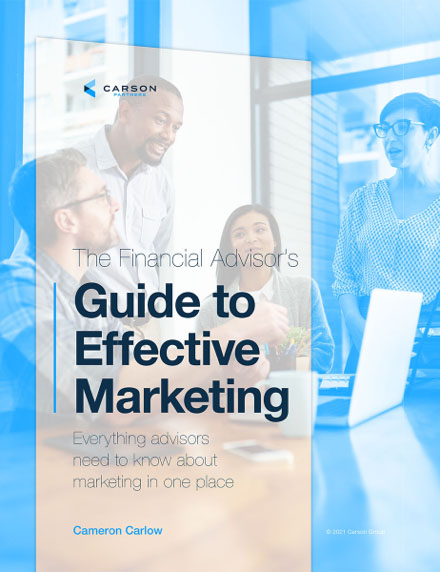Building a list of engaged prospects is a top priority for any advisor’s marketing efforts, but list-building can be a slow process. Unless you’re buying email lists (which you should never do), it’s a process months or years in the making. One of the best ways to help the process of list building is with lead magnets – downloadable resources that visitors give you their contact info in exchange for. Think ebooks, white papers, webinars, fact sheets, etc. But not every lead magnet is created equal, and the best lead magnets in one industry may make no sense in another. There are hundreds of different types of lead magnets out there. That’s why we created this list that ranks the top 10 types for financial advisors.
10. Calendar
A free, downloadable calendar is a great tool to help raise financial awareness and get your brand out there at the same time. Fill in important dates for taxes, Social Security, retirement planning and, of course, your firm’s upcoming events.
Ideas for calendars:
- The 50-Something’s Guide to Retirement Preparedness: 2019 Edition (this would be a great addition to a toolkit, as well)
- The Savvy Investor’s Guide to Important Dates of 2019
9. Fact Sheet
This one makes the list because of how well fact sheets can be used, but some shouldn’t even exist. Just know that not everything warrants a fact sheet. If your fact sheet is anything other than a bullet list of facts or an infographic of some sort, then it should probably just be a blog. I’ve seen too many fact sheets that are just blogs in disguise. (Check out our investment strategies fact sheet to see one at work. It’s short, to-the-point and valuable.)
Ideas for fact sheets
- Important Financial Dates for the Month/Year
- Everything You Need to Know About TCJA
8. Checklist
Everybody loves a good checklist. I’ve downloaded more than a few in my day. They can be incredibly helpful when you’re working in an area you’re not very familiar with (such as financial planning for most of the general public).
Ideas for checklists
- Retirement Income Sources
- Do You Qualify for the 199A Deduction?
- The Definitive Financial Planning Checklist for 30-Somethings
7. Ebooks/White Papers
At one point in time, I’m pretty sure ebooks and white papers were different things, but now the terms are largely used interchangeably to describe any downloadable resource, generally between 2 and 100 pages in length (although you should shoot for 5 to 30 pages for yours – any less and people will feel cheated, any more and no one will read the whole thing). The only difference I see between the two now is that people tend to use “white paper” when they want to sound more formal and “ebook” when they want to sound less so. “White papers” tend to be an effective tool for B2B marketing (business to business), so these could be a good route when talking to business owners about taking over their 401(k) plan. To be honest, the typical consumer isn’t interested in reading a research paper on financial matters, even if they should care more about it. That’s where the term “ebook” (or guide, tutorial, how to, kit, etc.) comes in so handy.
Ideas for ebooks/white papers
- The Retiree’s Guide to Social Security
- How to Pick a Retirement Planning Strategy
6. Worksheet
Worksheets are a great way to get visitors to really engage with your content. Whether it’s an editable PDF or a Word document, people love putting new information to practical use in their own lives. If you want to see a real-life worksheet in action, check out our recent one on how to rebrand your firm.
Ideas for worksheets
- How Much Money Should You Save Every Month?
- How to Identify Your Goals
5. Spreadsheet
This is where advisors shine. People look to you for expertise with the numbers, and if you can provide a spreadsheet that simplifies some complex calculations for them, people will use them for years to come. My wife and I still use the Larry Burkett monthly budgeting spreadsheet we got during our premarital counseling. Slap your logo on a spreadsheet you create and prospects will have very positive associations with your firm in the future.
Ideas for spreadsheets:
- Monthly Budget
- Yearly Budget
- Retirement Budget Planner
4. Webinar
This one is hit or miss. Great webinars are in high demand. Bad webinars – not so much. Chances are you give presentations to clients and prospects all the time. Why not take one of those presentations, promote it for a few weeks and then offer it as a webinar to see who comes? Make sure to include some sort of special offer, such as an exclusive consultation, so you can follow up with people while they’re still thinking about the subject. As an added bonus, once you’ve done your webinar, you can put the recording on a landing page and offer it as an on-demand webinar that continues to capture leads. While webinars may require more work on the front end to set up (that’s why we provide Carson Partners with several premade webinars every year), their shelf life is more than worth the effort.
Ideas for webinars:
- When Should You Claim Social Security?
- Retirement Planning for Dummies
3. Toolkit
The term “kit” gets thrown around a lot in marketing, but a true kit will come with multiple types of resources: spreadsheets, worksheets, calculators, ebooks, etc. Until the term “kit” gets fully diluted by lazy marketers mislabeling ebooks, this one still ranks pretty high.
Ideas for toolkits
- The Savvy Parent’s Toolkit for Building a Budget that Works
- Retirement Preparedness Toolkit
2. Quiz
If Buzzfeed has taught us anything (other than a fun lesson in the ethics of journalism), it’s that people love taking quizzes. The difficulty with quizzes is deciding where you’ll put the gate to capture visitor info. Do you let them see the results without putting in their email? Quiz completion rates tend to nosedive at the lead capture form, but if you’re not capturing leads, why run the quiz in the first place? We currently have two examples: our Risk Tolerance Quiz (non-gated results) and the Retirement Readiness Quiz (gated). There are pros and cons of each, so make sure you think them through.
Ideas for quizzes
- Where Should You Retire?
- When Should You Retire?
- How Much Risk Are You Comfortable With?
1. Calculator
Everybody loves calculators. They provide hard data while requiring very little effort on the part of the user. Plus, they’re fairly simple to build. If you can make an Excel spreadsheet, you can probably build a calculator using Gravity Forms (and if you’re not a Gravity Forms person, there’s always software like Outgrow). Don’t feel like your calculator has to be super complex. While a more Wade Pfau approach to calculators can provide great value, people still love those “When Can I Retire?” questionnaires.
Ideas for calculators
- When Should You Claim Social Security?
- How Long Will Your Savings Last in Retirement?
- How Much Do You Need to Save to Retire?
Now that you know what lead magnets you’re going to use, it’s time to get prospects to utilize them – and turn those leads into clients.


